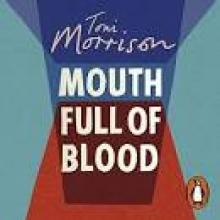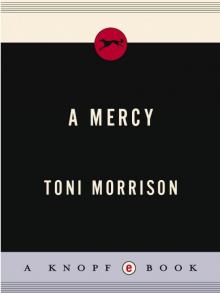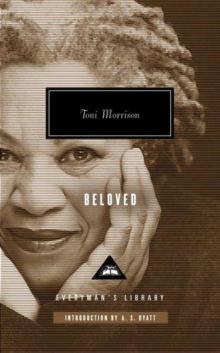- Home
- Toni Morrison
Paradise Page 2
Paradise Read online
Page 2
Strange neighbors, most folks said, but harmless. More than harmless, helpful even on occasion. They took people in—lost folk or folks who needed a rest. Early reports were of kindness and very good food. But now everybody knew it was all a lie, a front, a carefully planned disguise for what was really going on. Once the emergency was plain, representatives from all three churches met at the Oven because they couldn’t agree on which, if any, church should host a meeting to decide on what to do now that the women had ignored all warnings.
It was a secret meeting, but the rumors had been whispered for more than a year. Outrages that had been accumulating all along took shape as evidence. A mother was knocked down the stairs by her cold-eyed daughter. Four damaged infants were born in one family. Daughters refused to get out of bed. Brides disappeared on their honeymoons. Two brothers shot each other on New Year’s Day. Trips to Demby for VD shots common. And what went on at the Oven these days was not to be believed. So when nine men decided to meet there, they had to run everybody off the place with shotguns before they could sit in the beams of their flashlights to take matters into their own hands. The proof they had been collecting since the terrible discovery in the spring could not be denied: the one thing that connected all these catastrophes was in the Convent. And in the Convent were those women.
The father walks the aisle checking the pews right and left. He runs a frond of light from his Black & Decker under each seat. The knee rests are turned up. At the altar he pauses. One window of pale yellow floats above him in the dimness. Things look uncleaned. He steps to a tray of small glasses positioned on the wall to see if any food offerings remain there. Except for grime and spider webbing, the red glasses are empty. Maybe they are not for food but for money. Or trash? There is a gum wrapper in the dirtiest one. Doublemint.
He shakes his head and joins his son back at the altar. The son points. The father beams the wall below the yellow window where, just barely, the sun announces. The outline of a huge cross comes into view. Clean as new paint is the space where there used to be a Jesus.
The brothers approaching the cellar were once identical. Although they are twins, their wives look more alike than they do. One is smooth, agile and smokes Te Amo cigars. The other is tougher, meaner, but hides his face when he prays. But both have wide innocent eyes and both are as single-minded now standing before a closed door as they were in 1942 when they enlisted. Then they were looking for an out—a break away from a life where all was owed, nothing owned. Now they want in. Then, in the forties, they had nothing to lose. Now everything requires their protection. From the beginning when the town was founded they knew isolation did not guarantee safety. Men strong and willing were needed when lost or aimless strangers did not just drive through, hardly glancing at a sleepy town with three churches within one mile of one another but nothing to serve a traveler: no diner, no police, no gas station, no public phone, no movie house, no hospital. Sometimes, if they were young and drunk or old and sober, the strangers might spot three or four colored girls walk-dawdling along the side of the road. Walking a few yards, stopping as their talk required; skipping on, pausing to laugh or slap another’s arm in play. The strangers get interested in them, perhaps. Three cars, say, a ’53 Bel Air, green with cream-colored interior, license number 085 B, six cylinders, double molding on rear fender pontoon, Powerglide two-speed automatic transmission; and say a ’49 Dodge Wayfarer, black, cracked rear window, fender skirts, fluid drive, checkerboard grille; and a ’53 Oldsmobile with Arkansas plates. The drivers slow down, put their heads out the windows and holler. Their eyes crinkled in mischief they drive around the girls, making U-turns and K’s, churning up grass seed in front of the houses, flushing cats in front of Ace’s Grocery Store. Circling. The girls’ eyes freeze as they back into each other. Then, one at a time, the townsmen come out of the houses, the backyards, off the scaffold of the bank, out of the feed store. One of the passengers has opened the front of his trousers and hung himself out the window to scare the girls. The girls’ little hearts stand up and they cannot close their eyes fast enough, so they jerk their heads aside. But the townsmen do look at it, see the wish in this most militant of gestures, and smile. Smile reluctantly and in spite of themselves because they know that from this moment on, if not before, this man, till his final illness, will do as much serious damage to colored folks as he can.
More men come out, and more. Their guns are not pointing at anything, just held slackly against their thighs. Twenty men; now twenty-five. Circling the circling cars. Ninety miles from the nearest O for operator and ninety from the nearest badge. If the day had been dry, the dust spuming behind the tires would have discolored them all. As it was, just a little gravel kicked up in the tread they left behind.
The twins have powerful memories. Between them they remember the details of everything that ever happened—things they witnessed and things they have not. The exact temperature of the weather when the cars circled the girls as well as the bushel yield of every farm in the county. And they have never forgotten the message or the specifics of any story, especially the controlling one told to them by their grandfather—the man who put the words in the Oven’s black mouth. A story that explained why neither the founders of Haven nor their descendants could tolerate anybody but themselves. On the journey from Mississippi and two Louisiana parishes to Oklahoma, the one hundred and fifty-eight freedmen were unwelcome on each grain of soil from Yazoo to Fort Smith. Turned away by rich Choctaw and poor whites, chased by yard dogs, jeered at by camp prostitutes and their children, they were nevertheless unprepared for the aggressive discouragement they received from Negro towns already being built. The headline of a feature in the Herald, “Come Prepared or Not at All,” could not mean them, could it? Smart, strong, and eager to work their own land, they believed they were more than prepared—they were destined. It stung them into confusion to learn they did not have enough money to satisfy the restrictions the “self-supporting” Negroes required. In short, they were too poor, too bedraggled-looking to enter, let alone reside in, the communities that were soliciting Negro homesteaders. This contemptuous dismissal by the lucky changed the temperature of their blood twice. First they boiled at being written up as “people who preferred saloons and crap games to homes, churches and schools.” Then, remembering their spectacular history, they cooled. What began as overheated determination became cold-blooded obsession. “They don’t know we or about we,” said one man. “Us free like them; was slave like them. What for is this difference?”
Denied and guarded against, they altered their route and made their way west of the unassigned lands, south of Logan County, across the Canadian River into Arapaho territory. Becoming stiffer, prouder with each misfortune, the details of which were engraved into the twins’ powerful memories. Unembellished stories told and retold in dark barns, near the Oven at sunset, in the Sunday afternoon light of prayer meetings. About the saddles of the four black-skinned bandits who fed them dried buffalo meat before robbing them of their rifles. About the soundlessness of the funnel that twisted through and around their camp; the sleeping children who woke sailing through the air. The glint of the horses on which watching Choctaw sat. At suppertime, when it was too dark for any work except that which could be done by firelight, the Old Fathers recited the stories of that journey: the signs God gave to guide them—to watering places, to Creek with whom they could barter their labor for wagons, horses and pasture; away from prairie-dog towns fifty miles wide and Satan’s malefactions: abandoned women with no belongings, rumors of riverbed gold.
The twins believed it was when he discovered how narrow the path of righteousness could be that their grandfather chose the words for the Oven’s lip. Furniture was held together by wooden dowels because nails were so expensive, but he sacrificed his treasure of three-inch and four, bent and straight, to say something important that would last.
Once the letters were in place, but before anyone had time to ponder the words they formed, a roof wa
s raised next to where the Oven sat waiting to be seasoned. On crates and makeshift benches, Haven people gathered for talk, for society and the comfort of hot game. Later, when buffalo grass gave way to a nice little town with a street down the middle, wooden houses, one church, a school, a store, the citizens still gathered there. They pierced guinea hens and whole deer for the spit; they turned the ribs and rubbed extra salt into sides of cooling veal. Those were the days of slow cooking, when flames were kept so low a twenty-pound turkey roasted all night and a side could take two days to cook down to the bone. Whenever livestock was slaughtered, or when the taste for unsmoked game was high, Haven people brought the kill to the Oven and stayed sometimes to fuss and quarrel with the Morgan family about seasonings and the proper test for “done.” They stayed to gossip, complain, roar with laughter and drink walking coffee in the shade of the eaves. And any child in earshot was subject to being ordered to fan flies, haul wood, clean the worktable or beat the earth with a tamping block.
In 1910 there were two churches in Haven and the All-Citizens Bank, four rooms in the schoolhouse, five stores selling dry goods, feed and foodstuffs—but the traffic to and from the Oven was greater than to all of those. No family needed more than a simple cookstove as long as the Oven was alive, and it always was. Even in 1934 when everything else about the town was dying; when it was clear as daylight that talk of electricity would remain just talk and when gas lines and sewers were Tulsa marvels, the Oven stayed alive. Until the Big Drought, running water was not missed because the well was deep. As boys, the twins had swung overhand from the cottonwood branches leaning near it and hung dangerously above the clear water to admire the reflection of their feet. Time after time they heard stories of the blue dresses and bonnets the men bought for the women with cash from the first harvest or the first cuts from the herd. The theatrical arrival of the Saint Louis piano, ordered soon as Zion’s floor was laid. They imagined their mother as a ten-year-old among other young girls clustered quietly about the piano, sneaking a touch, a key stroke before the deaconess slapped their hands away. Their pure sopranos at rehearsal singing “He will take care of you…,” which He did, safe to say, until He stopped.
The twins were born in 1924 and heard for twenty years what the previous forty had been like. They listened to, imagined and remembered every single thing because each detail was a jolt of pleasure, erotic as a dream, out-thrilling and more purposeful than even the war they had fought in.
In 1949, young and newly married, they were anything but fools. Long before the war, Haven residents were leaving and those who had not packed up were planning to. The twins stared at their dwindling postwar future and it was not hard to persuade other home boys to repeat what the Old Fathers had done in 1890. Ten generations had known what lay Out There: space, once beckoning and free, became unmonitored and seething; became a void where random and organized evil erupted when and where it chose—behind any standing tree, behind the door of any house, humble or grand. Out There where your children were sport, your women quarry, and where your very person could be annulled; where congregations carried arms to church and ropes coiled in every saddle. Out There where every cluster of whitemen looked like a posse, being alone was being dead. But lessons had been learned and relearned in the last three generations about how to protect a town. So, like the ex-slaves who knew what came first, the ex-soldiers broke up the Oven and loaded it into two trucks even before they took apart their own beds. Before first light in the middle of August, fifteen families moved out of Haven—headed not for Muskogee or California as some had, or Saint Louis, Houston, Langston or Chicago, but deeper into Oklahoma, as far as they could climb from the grovel contaminating the town their grandfathers had made.
“How long?” asked the children from the back seats of the cars. “How long will it be?”
“Soon,” the parents replied. Hour after hour, the answer was the same. “Soon. Pretty soon.” When they saw Beaver Creek sliding through the muzzle of a state shaped like a gun, on through the acres of grass (cheaper than cheap after the tornadoes of 1949) that their pooled discharge pay had bought, it was pretty, soon and right on time.
What they left behind was a town whose once proud streets were weed-choked, monitored now by eighteen stubborn people wondering how they could get to the post office where there might be a letter from long gone grandchildren. Where the Oven had been, small green snakes slept in the sun. Who could have imagined that twenty-five years later in a brand-new town a Convent would beat out the snakes, the Depression, the tax man and the railroad for sheer destructive power?
Now one brother, a leader in everything, smashes the cellar door with the butt of his rifle. The other waits a few feet back with their nephew. All three descend the steps ready and excited to know. They are not disappointed. What they see is the devil’s bedroom, bathroom, and his nasty playpen.
The nephew always knew that his mother had tried as hard as she could to hang on. She had managed to see him ride the winning horse, but beyond that she had no strength. Not even enough to get interested in the debates about what to call this place she had traveled to with her brothers and her little boy. For three years New Haven had been the name most agreed to, although a few were loud in suggesting other names—names that did not speak, they said, of failure new or repeated. Pacific veterans liked Guam, others Inchon. Those who fought in Europe kept coming up with names only the children enjoyed pronouncing. The women had no firm opinion until the nephew’s mother died. Her funeral—the town’s first—stopped the schedule of discussion and its necessity. They named the town after one of their own and the men did not gainsay them. All right. Well. Ruby. Young Ruby.
It pleased his uncles who could then both mourn the sister and honor the friend and brother-in-law who didn’t make it back. But the nephew, winner of Ossie’s Purple Heart, heir to his father’s dog tags, witness to his mother’s name painted on signs and written on envelopes for the rest of his life, was displaced by these sad markings. The heart, the tags, the post office designation outsized him somehow. The women who had known and tended his mother spoiled Ruby’s boy. The men who enlisted with his father favored Ruby’s husband’s boy. The uncles took him for granted. When the decision was taken at the Oven, he was there. But two hours ago, when they’d swallowed the last piece of red meat, an uncle simply tapped him on the shoulder and said, “We got coffee in the truck. Go get your rifle.” Which he did, but he took the palm cross too.
It was four in the morning when they left; going on five when they arrived because, not wanting engine hum or headlights to ruin their cover of darkness, they walked the final miles. They parked the trucks in a copse of shin oak, for light could signal uninterrupted for mile upon mile in this country. When casing heads for fifty miles were invisible, a lit birthday cake could be spotted as soon as the match was struck. Half a mile from their destination fog surrounded them to their hips. They reached the Convent just seconds before the sun did and had a moment to see and register for all time how the mansion floated, dark and malevolently disconnected from God’s earth.
In the schoolroom, which used to be a dining room and now has no function except storage of desks pushed to the wall, the view is clear. The men of Ruby bunch at its windows. Finding nothing but confirming evidence elsewhere in the Convent, they gather here. The New Fathers of Ruby, Oklahoma. The chill they first encountered is gone; so is the mist. They are animated—warm with perspiration and the nocturnal odor of righteousness. The view is clear.
Track. That’s all the nephew can think of. Four-hundred-yard dashers or even the three-mile runners. The heads of two of them are thrown back as far as their necks will allow; fists tight as their arms pump and stretch for distance. One has her nappy head down, butting air and time wide open, one hand reaching for a winner’s wire nowhere in her future. Their mouths are open, pulling in breath, giving up none. The legs of all are off the ground, split wide above the clover.
Bodacious black Eves unredeemed by
Mary, they are like panicked does leaping toward a sun that has finished burning off the mist and now pours its holy oil over the hides of game.
God at their side, the men take aim. For Ruby.
MAVIS
The neighbors seemed pleased when the babies smothered. Probably because the mint green Cadillac in which they died had annoyed them for some time. They did all the right things, of course: brought food, telephoned their sorrow, got up a collection; but the shine of excitement in their eyes was clear.
When the journalist came, Mavis sat in the corner of the sofa, not sure whether to scrape the potato chip crumbs from the seams of the plastic cover or tuck them further in. But the journalist wanted the photo taken first, so the photographer ordered Mavis to the middle of the sofa, with the surviving children on either side of their distraught and grieving mother. She asked for the father too, of course. Jim? Is it Jim Albright? But Mavis said he wasn’t feeling so good, couldn’t come out, they’d have to go ahead without him. The journalist and the photographer exchanged looks, and Mavis thought they probably knew anyway that Frank—not Jim—was sitting on the edge of the bathtub drinking Seagram’s without a glass.
Mavis moved to the center of the sofa and cleaned her fingernails of potato chip dust until the other children joined her. The “other children” is what they would always be now. Sal put her arm around her mother’s waist. Frankie and Billy James were squished together on her right. Sal pinched her, hard. Mavis knew instantly that her daughter wasn’t nervous before the camera and all, because the pinch grew long, pointed. Sal’s fingernails were diving for blood.

 Paradise
Paradise Beloved
Beloved Home
Home Tar Baby
Tar Baby The Bluest Eye
The Bluest Eye Jazz
Jazz Love
Love Sula
Sula Mouth Full of Blood
Mouth Full of Blood Song of Solomon
Song of Solomon The Source of Self-Regard
The Source of Self-Regard A Mercy
A Mercy Beloved_a novel
Beloved_a novel